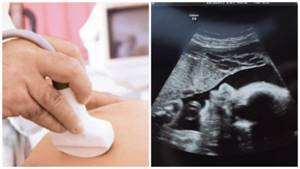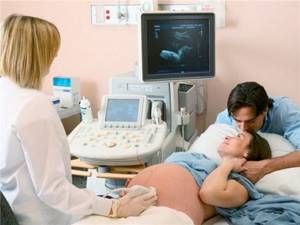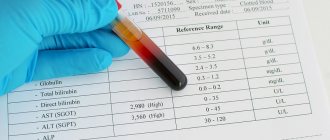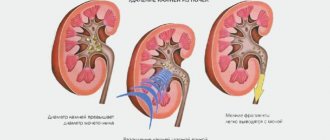An ultrasound at the 37th week of pregnancy is prescribed to determine the degree of maturity of the child, as well as compliance with the norm of all parameters of its development. From this period, the baby begins to gain about 1 cm per week, the amount of fat that he accumulates is 16 grams per day.
When performing a fetal ultrasound, the sonologist examines the following features:
- The location of the baby inside the uterus;
- Heart rate norm;
- The baby's maturity level;
- Condition of amniotic fluid;
- Degree of maturity of the placenta.
It is not necessary to take photos or videos at this time. They are performed to monitor the baby’s vital activity at the request of the expectant mother. On the monitor you can watch how the fetus grabs the umbilical cord. An ultrasound can also show whether the umbilical cord is wrapped around the fetal neck.
Interesting Facts
| Options | Indications |
| Time from conception | 35 weeks |
| Period by month | 37 weeks |
| What month | 9 |
| Dimensions and weight of the fetus | 486 mm, 2800 g |
| Uterus dimensions | VDM - 33-35 cm |
| Pregnant weight | Gain from the beginning of pregnancy is 10-15 kg; over the last week 200-300 g |
Your baby is the size of
Jackfruit
486 mm Size
2800 g Weight
At 37 full weeks, the fetus is already considered full-term, because all its organs and systems are ready to work outside the womb. Childbirth, especially the first one, can begin already at this time. Therefore, do not plan trips and always carry an exchange card with you.
Risk factors
One of the risk factors at 36–37 weeks of pregnancy is group B streptococcus. This is a bacterium that can settle in the vagina or area around the rectum. Group B streptococcus occurs in almost 35% of healthy adults. But if its colonies are present in a pregnant woman, the child may become infected during childbirth. And infected newborns need serious antibiotic treatment and close monitoring in the hospital because group B streptococcus can cause dangerous complications in babies, such as meningitis, pneumonia and blood poisoning. If you test positive for this bacterium, your doctor will likely prescribe antibiotics before and during labor. This measure will prevent transmission of the infection to the baby.
Childbirth at 37 weeks of pregnancy no longer poses a serious danger. If you have cramping pain in the abdomen and lower back, or early loss of amniotic fluid, you should call an ambulance. Sometimes a woman even needs premature birth - for example, if she is diagnosed with:
- Fetal hypoxia;
- Infection;
- Placental abruption;
- Entwining the baby with the umbilical cord.
In these cases, the method of delivery is chosen by the attending physician.
Feelings of the expectant mother
If your belly has dropped at 37 weeks, you've most likely experienced relief from unpleasant symptoms such as shortness of breath and heartburn. The descent of the uterus into the pelvic area is one of the harbingers of childbirth, along with training contractions, when you periodically feel your stomach becoming stone, the release of the mucus plug and weight loss of up to 1.5 kg.
These signs occur in both primiparous and multiparous women. It is not necessary that all at once: many women do not feel that their stomach is lowering until the very birth, and the plug may come off immediately before the onset of labor. Everything is very individual. In addition, even if you have discovered all the warning symptoms, not even the most experienced gynecologist will be able to tell you exactly when labor will begin. This “mechanism” has not yet been fully studied by specialists.
What are the indications for ultrasound at this stage?

Usually the third and last scheduled ultrasound is performed at 30-32 weeks. Most women have already completed it, and the expected due date has been adjusted. But for a number of reasons, another examination will be required immediately before birth. Most often it is recommended to pregnant women who have not had their last scheduled ultrasound. Other possible indications for this diagnosis:
- Low weight of the child and other developmental abnormalities in order to control the quality of treatment and diet.
- Twins to assess the position of babies before birth.
- Pelvic, transverse position of the fetus to determine delivery tactics.
- The need to correlate the size of the pelvis with the weight and growth of the fetus.
- Low water or, on the contrary, a large amount of amniotic fluid.
- Suspicion of hypoxia or umbilical cord entanglement based on other studies.
- Placenta previa is dangerous for the baby.
Ultrasounds are also performed at this stage for mothers who are planning to have a caesarean section. According to statistics, most indications for ultrasound examination before childbirth are related to studying the position of the baby. Not all babies lie head down - some are in a breech position or even positioned transversely. The first version of presentation is not an unambiguous indication for a cesarean section, the second is, although sometimes the baby literally lies down before birth as intended by nature.
What happens to the fetus
His body is so strong that even if he is born this week, the baby will be safe. All organs and systems have matured, except the digestive and respiratory systems, and are working at full capacity. The child trains breathing movements in the womb by swallowing amniotic fluid. That's why sometimes he hiccups, and mom feels twitches in her stomach.
His weight is 2.8 kg, adding 15 grams every day. The fetus moves less and sleeps more due to the tightness around it. However, despite this, within 12 hours you should count an average of 10 movements. If the number is noticeably higher or lower, seek help immediately: the fetus may be experiencing oxygen starvation.
From 37 weeks the process of aging of the placenta begins. This is inevitable and absolutely normal; it is only important that the degree of maturity of the child’s place corresponds to the stage of pregnancy. This is checked during an ultrasound.
Ultrasound of the fetus at 37 weeks - how it is done

Usually no preparation is required for examination of a pregnant woman. There are no special dietary requirements before an ultrasound; of course, there is no need to fast either. The only point: if you are prone to increased gas formation, you can take a drug that reduces flatulence (for example, Espumisan) a couple of hours before the procedure.
You should also not drink water while filling your bladder before the examination. The amount of amniotic fluid at this stage is large, and they provide an excellent opportunity to thoroughly study the fetus and its development, as well as examine the placenta, uterus, and cervix.
Ultrasound at the specified period is performed only in a transabdominal manner. You need to lie on your back and relax. A cushion is often placed under the right side, especially when the inferior vena cava is compressed by the uterus. After applying a special gel to the skin, a sensor will be moved across it - from the very top of the abdomen to the pubic joint. There will be no unpleasant sensations.
The price of an ultrasound at 37 weeks is practically the same as the cost of a routine examination five weeks earlier. Depending on the type of clinic, it will range from 1000-1500 rubles to 3000 rubles and more.
What to discuss with your doctor
- White discharge at 37 weeks of pregnancy may be normal if it is not accompanied by an unpleasant odor and itching in the perineum. In this case, we are talking about thrush, the treatment of which is simply necessary during gestation, since the fetus, passing through the birth canal, can become infected. Candidiasis of the oral or nasal mucosa is dangerous for a newborn because it complicates the feeding process.
- Many experts do not recommend intimate relationships in late pregnancy. The reason is a high risk of infection, especially after the mucus plug has come out. However, if you feel good, sex is possible. Choose comfortable positions, use a condom.
Necessary studies and analyzes
If you have a doctor's appointment this week, be sure to take a urine test first. If before this you had a decrease in hemoglobin, then a blood test could also be prescribed for you. These are the two most common tests that a woman has to undergo during pregnancy.
During your appointment, the gynecologist will ask you about your health and be sure to check how much your body weight, the height of the uterine fundus and abdominal circumference have changed. It is also necessary to listen to the fetal heart beat. They will also measure your blood pressure, because towards the end of pregnancy doctors pay very close attention to weight gain and blood pressure readings of a pregnant woman so as not to miss the appearance of the first signs of gestosis.
Possible complications
During this period, the expectant mother may be bothered by various unpleasant symptoms.
If you have a headache at 37 weeks of pregnancy
Perhaps the discomfort is associated with nervous tension or insomnia, which appears in the later stages. Don't forget about daily walks, ventilate the room before bed, ask your partner to massage your shoulders. There are painkillers that are safe for pregnant women, but you should consult your doctor before using them.
Why does the lower back tighten at 37 weeks of pregnancy?
Unpleasant sensations in the pelvis and back are associated with the preparation of bone tissue for labor. Under the influence of hormones they become softer and more elastic. For the same reason, the pubic bone may hurt.
Edema at 37 weeks of pregnancy
Slight swelling is normal for pregnant women. An alarming sign is when, after pressing on the swollen tissue, a hole remains. If you feel nauseous, your blood pressure rises, and in general you feel extremely bad, be sure to consult a gynecologist. These conditions are symptoms of gestosis in pregnant women.
Colds and ARVI
Mild catarrhal symptoms – runny nose or sore throat – will not harm the baby’s development in any way. The danger is high temperature. Note that the readings on the thermometer are 37° C, this is not a cause for alarm. During pregnancy, body temperature can normally rise to 37.2. If you really have a fever due to an acute respiratory viral infection, be sure to call a doctor and take medications only as prescribed.
How you feel
By the 37th week of pregnancy, the belly stops expanding, but the baby continues to gain weight, which is why it becomes increasingly cramped. There is practically nowhere to move, so there are fewer movements than before. But there should still be about 10 of them during the day.
Many women's bellies begin to droop, which is one of the signs that labor is approaching. If this does not happen by 37 weeks, do not be upset: sometimes the stomach drops only at the very end of pregnancy. But if this does happen, this does not mean that labor will begin right now - most likely, you need to wait a week or two. Now there will be no problems with breathing, however, due to the strong pressure of the fetus on the bladder, you will have to go to the toilet even more often.
The sheer size of the uterus can still cause discomfort in the spine. Try to get more rest by shifting the main responsibilities around the house to the future dad and other family members.
At 36–37 weeks of pregnancy, Braxton-Hicks contractions intensify and become longer. At the same time, you will have a clear feeling of tension and relaxation of the muscles of the uterus, but there should be no pain. Pain in the lower abdomen and regular contractions indicate the onset of labor. In this case, you need to urgently consult a doctor who will refer you to the maternity hospital.
At 36–37 weeks of pregnancy, the amount of vaginal discharge may increase. There is nothing to worry about - the time has come for the mucus plug to come out: its particles are lumps of mucus with red streaks that can be found in light-colored discharge. Sometimes the plug comes out all at once. In this case, you will see a lump of mucus about two tablespoons in volume.
Packing a bag for the maternity hospital
The thirty-seventh week of pregnancy is the optimal time to pack for the maternity hospital. Typically, an expectant mother needs 3 packages:
- In the maternity ward you will need documents, including an exchange card and birth certificate, a phone charger, a bottle of water, washable rubber slippers, socks or compression stockings, wet and/or dry wipes. You can also bring headphones; you can come to some maternity hospitals with your own fitball.
- The largest package is for the postpartum department. It should contain clothes and hygiene items for you and the baby: diapers, soap, napkins, nipple cream, etc. Relatives can bring food with them when visiting you.
- Prepare clothes for discharge for yourself and your newborn in advance, taking into account weather conditions and the fact that your body may not immediately return to its pre-pregnancy shape.
Modern rules in maternity hospitals have become less strict compared to what they were even a couple of years ago. Visits are allowed, and the mother can dress herself and the child in clothes brought from home, rather than using government-issued shirts and diapers. But we still advise you to find out in advance at the chosen institution what you can and cannot take with you.
Recommendations
To spend the remaining weeks in a good mood and without unnecessary problems, follow the following recommendations:
- Don't worry about your upcoming birth. So many women have already gone through this that doctors have accumulated vast experience in this matter. In addition, if you have a low pain threshold, there are different ways to ease the pain of a woman in labor, which you can talk about with your doctor in advance.
- Be careful when walking. Avoid accidental collisions with passers-by, and in winter, walk carefully so as not to fall.
- Avoid traveling during this period. And when you go for a walk, don’t go too far from home so that you can quickly walk back at any time.
- Be prepared to go to the maternity hospital at any time , so a bag with the necessary things and documents should be in a visible place.
- Try to avoid stressful situations , and to do this, find ways to calmly spend time and relax. Listen to music, sing, read. Ask your loved ones to help you with household chores if they are able to do so.
- Ensure yourself a good night's sleep , despite the fact that insomnia may be overwhelming you lately. Avoid late meals, ventilate your bedroom, and take a walk in the evening. Before going to bed, ask your husband to give you a light back massage, listen to relaxing music. Don't deprive yourself of the opportunity to get enough sleep, because soon you will have sleepless nights.
Checklist for 37 weeks of pregnancy
- To get rid of itchy skin in the abdominal area, regularly apply moisturizers and anti-stretch marks. It is extremely difficult to eliminate the formed stretch marks, but it is quite possible to prevent their appearance.
- If you decide that you want to breastfeed your baby, then you should prepare for this even before he is born. Read specialized literature, chat on thematic breastfeeding support forums, find an experienced lactation consultant.
- Invest in a supportive bra that will help maintain the shape of your breasts. Also think about comfortable clothing for breastfeeding in advance.
Possible problems
Not every pregnant woman experiences swelling at the beginning of the third trimester. But edema at 37 weeks of pregnancy is more than likely, since the circulatory, urinary and other systems, adapting to changes in the body of the expectant mother, work a little differently. In order not to miss the development of gestosis, pay close attention to the appearance of swelling. You need to monitor your weight gain, and it is advisable to measure your blood pressure regularly (daily). It is swelling, increased pressure, as well as the presence of protein in the results of a urine test that are signs of gestosis. If this symptom complex further develops, you may require emergency delivery. Be careful.
To reduce the development of edema, you can avoid salty foods, compensating for the taste of food with spices. You also need to slightly reduce the amount of liquid you drink. And don’t forget to rest during the day with your legs elevated, which will improve blood flow from them and, accordingly, reduce swelling.
Good to know
How to give birth without tearing: preparing the perineum for childbirth
How to sleep during pregnancy in the 3rd trimester?
“Pregnant” and maternal fears: how to stop being afraid
What to name the girl? Women's names and their meanings
Types of “pregnant” husbands
What to name the child? Choosing names according to the church calendar
All texts for pages about mother and baby were kindly provided by RAMA Publishing - these are chapters from the book by Svetlana Klaas “Your Favorite Little Man from Conception to Birth”, reviewer Irina Nikolaevna Kononova, Candidate of Medical Sciences, Associate Professor of the Department of Obstetrics and Gynecology of the Ural State Medical Academy (Ekaterinburg).
Useful advice for future parents
For the healthy development of a child, from the very moment of conception, love and sincere relationships between the expectant mother and father are very important.
At first glance, it seems that only when the Baby is born, your attitude towards each other, towards life, towards the people around you, your worldview, deeds, words and actions will begin to have a direct impact on the development of character, attitude, spiritual and moral qualities of the child. But it's not that simple. It turns out that all of the above affects the Baby even before birth! What to do, because nine months from conception to the birth of a child is a period of trials and problems for both the mother and the future father. How will the transformations taking place in a woman, frequent mood changes, irritation or even despondency, affect the Baby? Do the father's experiences affect a very tiny person? In general, are the feelings and moods of his parents transmitted to him, so tiny? And if so, how do they affect the pace of its development and overall well-being?
So, the child who is expected:
- more viable, since positive emotions of parents are one of the conditions for the successful bearing of a child and the development of all its organs and systems, as well as motor and intellectual activity;
- has a much greater chance of being born healthy, since his parents take care of his “nutrition”;
- develops better before birth, since its cells receive sufficient oxygen;
- smiles often (as Babies “repeat” their mother’s emotions);
- can respond with active movements to touches through the walls of the abdomen, as well as to affectionate words addressed to it.









